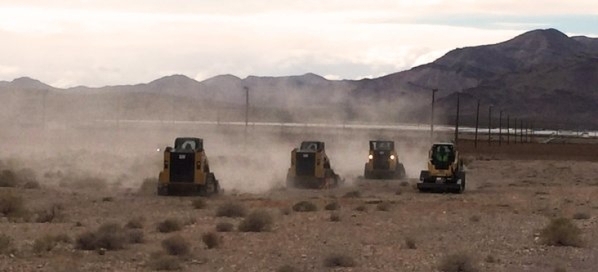Faraday Future flirts with air-quality rules violations on construction site
Faraday Future founder Jia Yueting said in December that he wants to build an electric car that "protects the earth and improves the living environment of mankind."
But the auto maker may already have run afoul of air-quality rules on its 900-acre site at Apex Industrial Park, based on recent photos that show earth-movers working the land without clear dust-control measures.
Any air-quality issues at the plant could have a big environmental impact: At 3 million square feet, Faraday Future's planned factory would be by far the largest industrial building in Southern Nevada, dwarfing the current recordholder, a 1.1 million-square-foot T.J. Maxx distribution center on Lone Mountain Road.
"It's a very, very large site," said Lea Kain, a supervisor in the Clark County Department of Air Quality's Compliance and Enforcement Division. Construction would likely last more than a year.
Faraday posted a Jan. 25 tweet showing six loaders trundling across the parcel, scraping scrub brush from the desert floor and leaving plumes of dust in their wake.
The tweet said: "This weekend we began clearing the way for our manufacturing facility in North Las Vegas!"
Faraday spokeswoman Stacy Morris said Wednesday that the photos depicted brush-clearing, "which is the first step in the construction process."
Any construction-related soil disturbance requires controls to limit airborne dust that might waft more than 50 yards from grading or building sites.
Faraday requires all of its contractors to follow dust-control regulations, Morris said.
Clark County issued Faraday a dust-control permit on Jan. 14, but "based solely on the photographs, it would appear that best available control measures were not being implemented at the time the equipment was disturbing the soil," Kain said.
Control measures might include sprinkling soil with water, applying chemical sealing or compacting the dirt before grading.
The Governor's Office of Economic Development, which approved $215 million in tax incentives for the Faraday plant in December and boasts on its home page that the automaker and two other companies will "boost Nevada's profile," wouldn't comment for this story. A spokeswoman said the office "doesn't play a role in this aspect of the project."
A spokesman for the city of North Las Vegas didn't return a phone call seeking comment on the plant.
Dust is a big environmental issue in Clark County, which once faced losing hundreds of millions of dollars in federal highway funds unless it cleared the air. The county began cracking down on "fugitive dust" from construction sites in the late 1990s, paving dirt roads, mandating dust-control classes for contractors, conducting thousands of annual site inspections and fining violators. The agency even developed an advertising campaign that got national attention for its "don't be a dusthole" slogan.
The valley has averaged one dusty day a year in the last six years, compared with 50 days a year before the county launched its enforcement and information campaign. The U.S. Environmental Protection Agency, which threatened in 2003 to take over local clean-air programs, ruled in 2014 that the valley finally met federal standards for airborne dust particles and was in the clear.
Kain said both enforcement officials and field inspectors were notified of the activity on the Faraday site, and the agency will monitor the property for future fugitive dust. The maximum possible fine for a continued dust-control violation is $10,000 per day, but Kain said the agency prefers to educate and work with emitters before cases escalate that far.
Faraday hasn't heard from dust-control officials, Morris said.
Contact Jennifer Robison at jrobison@reviewjournal.com. Follow @_JRobison on Twitter.

















